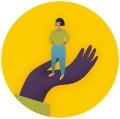Young People
Help and Support 
You may be a young person affected by sexual violence yourself, or you may be supporting another young person. Below are some resources that might be useful. The green booklet was created by Edinburgh Rape Crisis Centre and refers to Edinburgh based support services as well as national services. If you’re in another local authority, please contact the local Rape Crisis Centre for details of support in the area.
How Schools Can Best Support Young People
The role of individual staff members in supporting a young person will depend on their position and the nature of their relationship to the young person. A number of staff members are likely to be involved in coordinating a supportive response, with certain staff members taking a lead for addressing child protection concerns.
Young people who have experienced gender-based violence (GBV) often blame themselves for what happened to them, fear not being believed by those who they disclose to, and worry about being judged. Schools can relieve some of the harm and help support their recovery by:
- Listening to young people and asking them about their needs
- Believing them when they disclose
- Helping them to recognise that what happened was not their fault
- Outlining what support is available at school and facilitating access to appropriate specialist support
- Explaining procedures and making appropriate arrangements to encourage engagement with school and access to support services
- Protecting confidentiality and only sharing information with others that needs to be shared. Always try to do this in discussion with the young person.
Schools are sometimes worried about taking an approach of believing those who disclose violence or abuse, if the reported perpetrator is also a member of the same school (eg. a staff member or a student) before there has been any investigation. This can be managed however, by ensuring any investigation is conducted by someone separate, so that staff members involved in directly supporting the young person can focus entirely on their wellbeing and safety needs.
Experiencing GBV can be traumatic. In response to traumatic events, people commonly develop adaptive responses intended - often unconsciously - to help them survive, such as avoidance, disengagement, lack of trust, and dissociation (‘tuning out’). These responses might help in the short term, but they can often lead to longer-term problems. It’s important for schools to be aware that young people affected by GBV might display some of these behaviours and to consider what the underlying causes might be. This will seek to show understanding and gradually build trust with the young person, helping them to develop more positive strategies and behaviours over time.
Many people heal from GBV and learn to cope with what happened to them in their own way. There is no set time for healing, so it’s important to adopt a non-judgemental approach and go at the young person’s pace. Above all, ensure young people are involved in any decisions affecting them, wherever possible.
Young People’s Experiences of School Responses to GBV 
Young survivors who took part in the Everyday Heroes consultation for the Equally Safe delivery plan in 2018, talked about the responses they received at school, what they felt schools needed to do to improve survivors’ experiences, and their trust in talking to schools about GBV.
Many of the children and young people involved said school hadn’t felt like a safe place to disclose their experiences; there were examples of teachers asking lots of questions, standing up for the perpetrator, showing a lack of understanding of their experiences, feeling judged and stigmatised, excluding them, and having little respect for their privacy and confidentiality.
They wanted school staff to have more training and knowledge about GBV so that they could respond more appropriately and be better able to recognise potential signs of abuse. They also asked that schools took care around their confidentiality and didn’t share information inappropriately.
You can read about the positive experience of one young survivor called Ella, including how her school supported her and the difference it made.